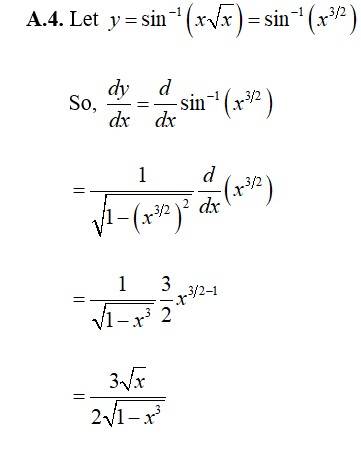Continuity and Differentiability
Get insights from 335 questions on Continuity and Differentiability, answered by students, alumni, and experts. You may also ask and answer any question you like about Continuity and Differentiability
Follow Ask QuestionQuestions
Discussions
Active Users
Followers
New answer posted
7 months agoContributor-Level 10
117. Solution :
Mean Value Theorem states that for a function f[a,b] →R, if
(a) f is continuous on [a, b]
(b) f is differentiable on (a, b)
then, there exists some c ∈ (a, b) such that
Therefore, Mean Value Theorem is not applicable to those functions that do not satisfy any of the two conditions of the hypothesis.
for
It is evident that the given function f (x) is not continuous at every integral point.
In particular, f(x) is not continuous at x = 5 and x = 9
⇒ f (x) is not continuous in [5, 9].
The differentiability of f in (5, 9) is checked as follows.
Let n be an integer such that n ∈ (5, 9).
The righ
New answer posted
7 months agoContributor-Level 10
116. Solution:
The given function f is f, being a polynomial function, is continuous in [1, 3] and is differentiable in (1, 3) whose derivative is 3x2 − 10x − 3.
Mean Value Theorem states that there exists a point c ∈ (1, 3) such that f'(c) = - 10
Hence, Mean Value Theorem is verified for the given function and c = 7/3 ∈ (1,3) is the only point for which f'(c) = 0
New answer posted
7 months agoContributor-Level 10
115.
Solution :
The given function is f, being a polynomial function, is continuous in [1, 4] and is differentiable in (1, 4) whose derivative is 2x − 4.
Mean Value Theorem states that there is a point c ∈ (1, 4) such that f' (c) = 1
Hence, Mean Value Theorem is verified for the given function.
New answer posted
7 months agoContributor-Level 10
114. Solution :
It is given that f: [-5,5]? R is a differentiable function.
Since every differentiable function is a continuous function, we obtain
(a) f is continuous on [?5, 5].
(b) f is differentiable on (?5, 5).
Therefore, by the Mean Value Theorem, there exists c? (?5, 5) such that
It is also given that f' (x) does not vanish anywhere.
Hence, proved.
New answer posted
7 months agoContributor-Level 10
113. Solution:
By Rolle's Theorem, for a function if
f is continuous on
f is differentiable on
f(a)= f(b)
then, there exists some such that
therefore, Rolle's Theorem is not applicable to those functions that do not satisfy any of the three conditions of the hypothesis.
for
It is evident that the given function f(x) is not continuous at every integral point.
In particular, f(x) is not continuous at x=5 and x=9
f(x) is not continuous in
Also,
The differentiability of f in is checked as follows.
Let n be an integer such that .
The left hand limit of f at x
New answer posted
7 months agoContributor-Level 10
112. Given, , being polynomial function is continuous in and also differentiable in .
Therefore,
The value of at -4 and 2 coincides.
Rolle's Theorem states that there is a point such that
Therefore,
Hence,
Thus,
Hence, Rolle's Theorem is verified.
Taking an Exam? Selecting a College?
Get authentic answers from experts, students and alumni that you won't find anywhere else
Sign Up on ShikshaOn Shiksha, get access to
- 66k Colleges
- 1.2k Exams
- 681k Reviews
- 1800k Answers


